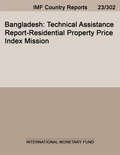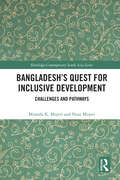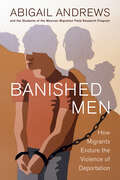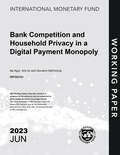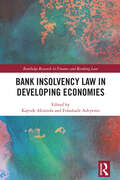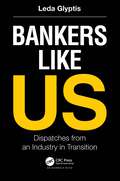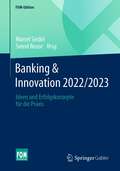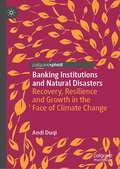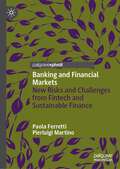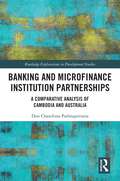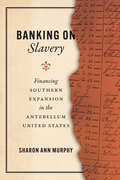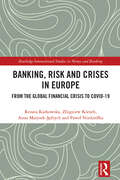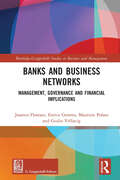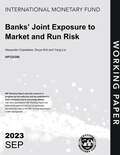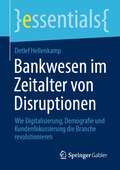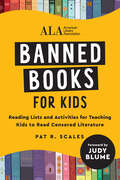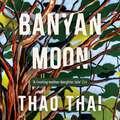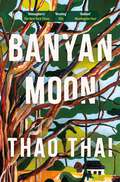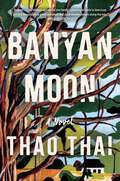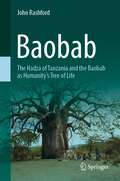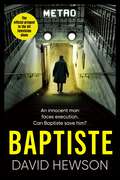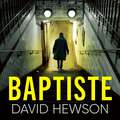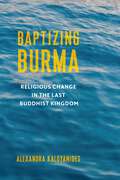- Table View
- List View
Bangladesh: Technical Assistance Report-residential Property Price Indices Mission (Imf Staff Country Reports)
by International Monetary Fund. Statistics Dept.A report from the International Monetary Fund.
Bangladesh’s Quest for Inclusive Development: Challenges and Pathways (Routledge Contemporary South Asia Series)
by Mustafa K. Mujeri Neaz MujeriThe book provides a comprehensive conceptual understanding covering major challenges and pathways to progressively promote inclusive development in Bangladesh. Since independence in 1971, Bangladesh has achieved significant economic growth and social progress, but the benefits have not been shared equitably across all groups in society and there is the demand that inclusive development should be at the core of the country’s development agenda. Analysing inclusive development in Bangladesh, the authors present it as synonymous with improving the well-being of all individuals in a comprehensive manner along with upholding the principles of equity and justice. The book shows that the multi-dimensionality of inclusive development facilitates the participation of all in society in development through enhancing capabilities and ensuring equal opportunities. The analysis highlights social investments in specific concerns of the marginalised and disadvantaged groups and unequal structural forces that compel the state to remain biased towards the rich and consequent ‘elite capture’ of the state in Bangladesh. Arguing that Bangladesh has moved closer towards applying the inclusive development tenets in policy making, the book’s findings show that the challenge is the absence of any generic formula to ensure that the country is moving towards a more inclusive development path. A valuable contribution to the study of Bangladesh's changing dynamics of political, economic and social configurations and development economics, the book will be of interest to researchers in the fields of Economics, Asian Studies and Development Studies.
Banished Men: How Migrants Endure the Violence of Deportation
by Abigail Leslie AndrewsA free ebook version of this title is available through Luminos, University of California Press’s Open Access publishing program. Visit www.luminosoa.org to learn more. What becomes of men the U.S. locks up and kicks out? From 2009 to 2020, the U.S. deported more than five million people—over 90 percent of them men. In Banished Men, Abigail Andrews and her students tell 186 of their stories. How, they ask, does expulsion shape men's lives and sense of themselves? The book uncovers a harrowing carceral system that weaves together policing, prison, detention, removal, and border militarization to undermine migrants as men. Guards and gangs beat them down, till they feel like cockroaches, pigs, or dogs. Many lose ties with family. They do not go "home." Instead, they end up in limbo: stripped of their very humanity. Against the odds, they fight for new ways to belong. At once devastating and humane, Banished Men offers a clear-eyed critique of the violence of deportation.
Bank Competition and Household Privacy in a Digital Payment Monopoly
by Dell'AricciaA report from the International Monetary Fund.
Bank Insolvency Law in Developing Economies (Routledge Research in Finance and Banking Law)
by Kayode Akintola Folashade AdeyemoThe subject of bank stability has been under a great amount of political and legislative scrutiny since the mid-2007 to late-2009 global financial crisis. However, these efforts have centred on developed economies. Little coverage is given to strategies adopted by many developing economies. While there is a global discourse on the subject of insolvency generally, there is ample scope to contribute to the growing body of work on the narrow subject of bank insolvencies. This book provides a unique perspective on an emerging theme in at least two respects. First is the focus on selected developing economies and selected developed economies in the EMEA region alongside cross-border developments, with the objective of deciphering the regulatory approach to bank insolvencies. The second is the analytical consideration of methods that may be implemented to preclude or resolve bank insolvencies in developing economies. This book explores the nexus between developing economies and their banking institutions. Developing economies are acutely dependent on their banks for the functioning of their cash-based economies. Recent events, however, suggest a weakness in the long-term viability of some of their banks and a mixed-bag regulatory approach to redress this weakness. This book evaluates the effectiveness of regulatory frameworks in selected developing economies that are designed to prevent or resolve the insolvency of banks. At a time of global economic uncertainty, this book will prove to be a valuable resource to the discourse on the viability of banks, businesses, and economies in developing States.
Bank- und Finanzwirtschaft im Stress: Aktuelle Herausforderungen und Lösungsansätze
by Stephan Schöning Sonja Schütte-Biastoch Nils MochDieses Buch fokussiert die mannigfaltigen Herausforderungen, mit denen die Bank- und Finanzwirtschaft aktuell konfrontiert ist. Digitalisierung, Sustainable Development Goals/Nachhaltigkeit (Green Finance), Globalisierung, Pandemie-Folgen, demografischer Wandel, Ukraine-Krieg und Konsequenzen für die Weltwirtschaft betreffen nicht nur Banken und Sparkassen, den Finanzbereich und das Rechnungswesen von Unternehmen sowie die Wirtschaftsprüfung, sondern sind auch in vielfältiger Natur miteinander verknüpft. Entsprechend sind Akteure im Finanzbereich gefordert, sich auf diese Herausforderungen einzustellen und zukunftsbezogene Lösungsansätze zu entwickeln. Namhafte Expertinnen und Experten aus Wissenschaft und Praxis geben Antworten auf die drängenden Fragen in der Finanzwirtschaft.
Bankers Like Us: Dispatches from an Industry in Transition
by Leda GlyptisThis book will resonate with anyone no matter where you reside on this journey, whether newbie or old guard. If you want to be part of this change, you need to understand all about the messy middle that Leda so expertly describes in this book. If you read this book and it doesn’t resonate, then I suggest you think about stepping aside. — Curt Queyrouze, President, Coastal Community Bank The world is going digital, and so is banking—in fits, starts, and circles. Why is it so hard? Why is the industry constantly getting in the way of its own technological progress and what can we do about it all? This book looks at the human and structural obstacles to innovation-driven transformation and at the change in habits, mindsets and leadership needed for the next stage of the digital journey and argues that this change will be brought about, not by external heroes and saviours, not by a generation yet to be born, but people just like us. People who understand the industry and its quirks. Bankers who have the grit, determination and energy to drive change. Bankers like us. This book celebrates and chronicles the shared experience of bankers like us. It starts with a ‘this is who we are’ piece, including the author’s trench credentials. It then presents an overview of corporate culture (this is what we deal with and a few ideas on how to handle it), as well as a piece on why transformation is so difficult and so many get it wrong; a piece on the challenges our lack of diversity brings or compounds, and a hopeful look-ahead on what a team of principled, dedicated folks can do despite everything.
Banking & Innovation 2022/2023: Ideen und Erfolgskonzepte für die Praxis (FOM-Edition)
by Marcel Seidel Svend ReuseDie Banking- und Finance-Szene sieht sich national wie international unablässig neuen Herausforderungen gegenüber. Um diesen Herausforderungen gerecht zu werden, zeigen Innovationsexpertinnen und -experten aus Wissenschaft und Praxis in der Buchreihe „Banking & Innovation“ neue strategische, organisatorische, kulturelle und methodische Problemlösungen für die Bankbranche auf. Diese Lösungen sind zum Teil bankenspezifisch, zum Teil wurden sie aus anderen Branchen auf den Bankenbereich übertragen. Führungskräfte sowie Entscheiderinnen und Entscheider in der Finanzbranche, die kreativ und vor allem langfristig denken und handeln, erhalten hier wertvolle Anregungen. Dieser Band enthält 34 Beiträge, die sich mit neuen Ideen einer strategischen Ausrichtung, mit kulturell-personalwirtschaftlich orientierten Themen, technischen und methodischen Vorgehensweisen sowie rechtlichen Herausforderungen im Banking beschäftigen.Der Fokus der Ausgabe 2022/2023 liegt auf aktuellen Erfolgsfaktoren im Banking. Neue inhaltliche Schwerpunkte sind rechtliche Herausforderungen, Risikosteuerung und Payment, Digitalisierung und Technik.Der Inhalt- Strategie, Geschäftsmodell und Kultur- Strukturen, Prozesse und Führung- Produkte und Dienstleistungen- Risikosteuerung und Aufsicht- Rechtliche Herausforderungen- Payment, Digitalisierung und Technik
Banking Institutions and Natural Disasters: Recovery, Resilience and Growth in the Face of Climate Change (Palgrave Studies in Impact Finance)
by Andi DuqiThis book looks more closely at how natural disasters impact bank activity and how banks can support economic recovery after a natural disaster. The importance of banks in this context is underscored by increasing regulatory attention on their role in fostering a sustainable future, but also on the risks that climate change poses to bank stability. Humanity has tried to cope with the short- and long-term economic consequences of natural disasters for centuries. However, the severity of these events is constantly increasing in magnitude, due to the alteration of the earth’s climate and the environment. They pose a serious threat to the lives of millions of people especially in less developed countries. At the same time, the international community has acknowledged that weather hazards’ impact and countries’ resilience to them are affected by various socio-economic factors, such as the well-functioning of financial institutions, especially commercial banks. Banks will inevitably adapt their strategies to address concerns arising from climate change. In doing this, the book discusses partnerships with international cooperation institutions, other financial intermediaries, and local governments, so that the green transition ensures an inclusive growth for all, especially the most vulnerable parts of our societies. This book is of interest to researchers, academics, and students of sustainable finance and climate finance.
Banking and Financial Markets: New Risks and Challenges from Fintech and Sustainable Finance
by Paola Ferretti Pierluigi MartinoThis book provides the foundational knowledge essential for comprehending the functioning of financial markets and institutions and their current challenges. First, the book provides a general overview on the functioning of the EU financial system, examining financial markets and financial intermediaries’ features and activity and their contribution to economic growth. It also outlines the evolution of the EU integration process, giving an overview of the most important regulatory steps related to the banking and financial system culminated in the creation of the Banking Union. Banking activity is also examined in the most important business areas: commercial versus investment banking. Lastly, the book introduces two important phenomena, which are currently characterizing the financial environment: FinTech and sustainable finance. Both FinTech and sustainable finance represent significant opportunities for the market and the operators, even if the challenges and risks associated are also relevant. This underlines the need to understand their intensity and their potential impact on the functioning of the financial system as a whole.
Banking and Microfinance Institution Partnerships: A Comparative Analysis of Cambodia and Australia (Routledge Explorations in Development Studies)
by Don Chandima PadmaperumaThis book examines partnerships between commercial banks and microfinance institutions (MFIs). It demonstrates that when set up properly, these partnerships have the potential to develop and enhance the financial inclusion agenda, and further support sustainable development. MFIs provide access to finance predominantly for those who are poor but economically active, and therefore their expansion is imperative for inclusive economic development. However, MFIs are faced with enormous challenges. The book discusses how partnering with a commercial bank can meet these challenges and the process of interaction contributing to the enhancement of institutional robustness of MFIs. Through two distinct case studies, in Cambodia and Australia, the book discusses the motivations, objectives and operational dynamics of a partnership, as well as the challenges, success factors, and potential benefits, from the increase in outreach and sustainability, to the transference of knowledge and potential for capacity building. Similarly, the partnering banks benefit in line with the intended objectives–commercial or social besides help embedding social consciousness and improving staff engagement. Concluding with elucidating the characteristics of a partnership model that can succeed across different global contexts, the book will interest a range of researchers and students across development economics, banking, finance, and sustainable development.
Banking on Slavery: Financing Southern Expansion in the Antebellum United States (American Beginnings, 1500-1900 Ser.)
by Sharon AnnA sobering excavation of how deeply nineteenth-century American banks were entwined with the institution of slavery. It’s now widely understood that the fullest expression of nineteenth-century American capitalism was found in the structures of chattel slavery. It’s also understood that almost every other institution and aspect of life then was at least entangled with—and often profited from—slavery’s perpetuation. Yet as Sharon Ann Murphy shows in her powerful and unprecedented book, the centrality of enslaved labor to banking in the antebellum United States is far greater than previously thought. Banking on Slavery sheds light on precisely how the financial relationships between banks and slaveholders worked across the nineteenth-century South. Murphy argues that the rapid spread of slavery in the South during the 1820s and ’30s depended significantly upon southern banks’ willingness to financialize enslaved lives, with the use of enslaved individuals as loan collateral proving central to these financial relationships. She makes clear how southern banks were ready—and, in some cases, even eager—to alter time-honored banking practices to meet the needs of slaveholders. In the end, many of these banks sacrificed themselves in their efforts to stabilize the slave economy. Murphy also details how banks and slaveholders transformed enslaved lives from physical bodies into abstract capital assets. Her book provides an essential examination of how our nation’s financial history is more intimately intertwined with the dehumanizing institution of slavery than scholars have previously thought.
Banking, Risk and Crises in Europe: From the Global Financial Crisis to COVID-19 (Routledge International Studies in Money and Banking)
by Anna Matysek-Jędrych Renata Karkowska Zbigniew Korzeb Paweł NiedziółkaEuropean economies have been plagued by successive crises, from the Global Financial Crisis (GFC) to the COVID-19 pandemic, through to the economic and geopolitical instability in Ukraine. These events, the uncertainty they generate combined with dynamic technological progress and significant sociocultural changes, have profoundly modified the character of modern finance. Understanding what happened, what mechanisms worked, and the reaction of the banking sector, bank customers, and policymakers require an in-depth and structured analysis. This book critically assesses the impact of these events, notably the COVID-19 pandemic, on the performance of the banking sector in Europe and serves as a compendium of knowledge on recent changes in European banking from two perspectives: firstly, European banking transformation, analyzing the process of what has already taken place, in particular, the GFC and COVID-19 crises; secondly, the challenges facing the operations and strategic management of European banks. It identifies specific areas of impact on the activity of commercial banks and the determining factors that will shape the economic and financial condition of banks and their customers – borrowers – in the future. Risk management, particularly credit risk, is a key focus of this volume. Each chapter, implicitly or explicitly, address a variety of questions that can help the reader to understand the complex nature of the transformation of the banking sector. The book provides a structured reference for those concerned with the impact of volatility on the business models of modern banks. As such, it will find a broad audience among students, academics, banking, financial, business, and industry professionals, policymakers, and market regulators.
Banks and Business Networks: Management, Governance and Financial Implications (Routledge-Giappichelli Studies in Business and Management)
by Josanco Floreani Maurizio Polato Enrico Geretto Giulio VelliscigWhile there is a vast amount of literature examining firm’s networks from an industrial organization perspective, the financial implications of networking remain underexplored. This book fills this gap, by investigating the phenomenon of business networks in the context of management and governance processes, and the related effects on interactions with the financial system in general, and credit institutions in particular. Networking is examined both from the demand (firms) and supply (banking institutions) perspective, thus, the book offers several contributions. It outlines the critical issues connected to business aggregations from the point of view of the management of information flows, and addresses the problem of identifying the role of banking ecosystems, in light of the transformations taking place in the financial industry, considering the growing complementarity between bank and market instruments in corporate financing. It explores the problem of identifying rating models for business networks, as well as, for individual participants on a stand-alone basis. Further, the book analyses a sample of networks in Friuli-Venezia Giulia and profiles a number of specific business cases. The book will be of particular interest to researchers and scholars in the field of banking and finance but also entrepreneurship and small business management. It will also find an audience among scholars from a wide array of additional fields, working on the relationship between financing concerns and growth opportunities.
Banks’ Joint Exposure to Market and Run Risk (Imf Working Papers)
by LiuA report from the International Monetary Fund.
Bankwesen im Zeitalter von Disruptionen: Wie Digitalisierung, Demografie und Kundenfokussierung die Branche revolutionieren (essentials)
by Detlef HellenkampDigitalisierung, demografischer Wandel und ein sich wiederkehrend verändertes Kundenverhalten stellen das Bankwesen vor Herausforderungen, die es bisher in dieser Form noch nicht gegeben hat. Dieses essential betrachtet neben den wesentlichen Herausforderungen auch die Möglichkeiten, die diese Veränderungen mit sich bringen. Es soll dazu beitragen, sie zu verstehen und Anregungen sowie Strategien zur Anpassung im Bankwesen kritisch zu diskutieren.
Banned Books for Kids: Reading Lists and Activities for Teaching Kids to Read Censored Literature
by American Library Association (ALA)From the American Library Association comes an expansive guide to teaching banned books to children at home or in the classroom, with a forward by renowned children's author Judy Blume.Books matter. In our polarized environment, the censorship and outright banning of children's books remains a major concern for libraries. The American Library Association, an intellectual freedom champion, has created this illuminating and expansive guide for book lovers who hope to teach children the importance of banned literature. With a focus on modern books that have been banned, along with classic literature that continues to be under attack for political or religious reasons, Teaching Banned Books to Kids will educate adults and children about the importance of books. With useful tools and techniques, caregivers and educators will find the best ways to talk about banned books to children.
Banyan Moon
by Thao ThaiA READ WITH JENNA BOOK CLUB PICK"A riveting mother-daughter tale" - Elle"A joy to read" Christina Baker Kline, #1 New York Times bestselling author of The Exiles Ann Tran is already at a crossroads when she gets the call that her beloved grandmother, Minh, has died. Ann has built a seemingly perfect life. She lives in a beautiful lake house and has a charming professor boyfriend, but it all crumbles away with one positive pregnancy test. With both her relationship and carefully planned future now in question, Ann returns home to Florida to face her estranged mother, Hu'o'ng. Under the same roof for the first time in years, mother and daughter must face the simmering questions of their past, while trying to rebuild their relationship without the one person who's always held them together. Running parallel to this is Minh's story, as she goes from a lovestruck teenager living in the shadow of the Vietnam War to a determined young mother immigrating to America in search of a better life. And when Ann makes a shocking discovery in the Banyan House's attic, long-buried secrets come to light as it becomes clear how decisions Minh made in her youth affected the rest of her life and her family. Spanning decades and continents, from 1960s Vietnam to the wild swamplands of the Florida coast, Banyan Moon is a stunning and deeply moving story of mothers and daughters, the things we inherit, and the lives we choose to make out of that inheritance."Heart-shatteringly beautiful. Banyan Moon is a love letter to keepers of secrets, to motherhood, family and survival." - Nguyen Phan Que Mai, internationally bestselling author of The Mountains Sing and Dust Child.(P) 2023 HarperCollins Publishers
Banyan Moon
by Thao ThaiA READ WITH JENNA BOOK CLUB PICK"A riveting mother-daughter tale" - Elle"A joy to read" Christina Baker Kline, #1 New York Times bestselling author of The Exiles Ann Tran is already at a crossroads when she gets the call that her beloved grandmother, Minh, has died. Ann has built a seemingly perfect life. She lives in a beautiful lake house and has a charming professor boyfriend, but it all crumbles away with one positive pregnancy test. With both her relationship and carefully planned future now in question, Ann returns home to Florida to face her estranged mother, Hu'o'ng. Under the same roof for the first time in years, mother and daughter must face the simmering questions of their past, while trying to rebuild their relationship without the one person who's always held them together. Running parallel to this is Minh's story, as she goes from a lovestruck teenager living in the shadow of the Vietnam War to a determined young mother immigrating to America in search of a better life. And when Ann makes a shocking discovery in the Banyan House's attic, long-buried secrets come to light as it becomes clear how decisions Minh made in her youth affected the rest of her life and her family. Spanning decades and continents, from 1960s Vietnam to the wild swamplands of the Florida coast, Banyan Moon is a stunning and deeply moving story of mothers and daughters, the things we inherit, and the lives we choose to make out of that inheritance."Heart-shatteringly beautiful. Banyan Moon is a love letter to keepers of secrets, to motherhood, family and survival." - Nguyen Phan Que Mai, internationally bestselling author of The Mountains Sing and Dust Child.WHAT READERS ARE SAYING ABOUT BANYAN MOON'A wonderful debut novel' 5* Reader Review'A gorgeous and absorbing family saga' 5* Reader Review'This is an epic, sweeping debut from a writer who is definitely one to watch' 5* Reader Review
Banyan Moon: A Read with Jenna Pick
by Thao ThaiA TODAY Show #ReadWithJenna Book Club Pick"A riveting mother-daughter tale." — Elle"Radiant. … An intimate account of one family’s planting of roots in American soil and the sacrifices great and small that each member makes along the way.” — Washington PostA sweeping, evocative debut novel following three generations of Vietnamese American women reeling from the death of their matriarch, revealing the family’s inherited burdens, buried secrets, and unlikely love stories. When Ann Tran gets the call that her fiercely beloved grandmother, Minh, has passed away, her life is already at a crossroads. In the years since she’s last seen Minh, Ann has built a seemingly perfect life—a beautiful lake house, a charming professor boyfriend, and invites to elegant parties that bubble over with champagne and good taste—but it all crumbles with one positive pregnancy test. With both her relationship and carefully planned future now in question, Ann returns home to Florida to face her estranged mother, Huơng.Back in Florida, Huơng is simultaneously mourning her mother and resenting her for having the relationship with Ann that she never did. Then Ann and Huơng learn that Minh has left them both the Banyan House, the crumbling old manor that was Ann’s childhood home, in all its strange, Gothic glory. Under the same roof for the first time in years, mother and daughter must face the simmering questions of their past and their uncertain futures, while trying to rebuild their relationship without the one person who’s always held them together.Running parallel to this is Minh’s story, as she goes from a lovestruck teenager living in the shadow of the Vietnam War to a determined young mother immigrating to America in search of a better life for her children. And when Ann makes a shocking discovery in the Banyan House’s attic, long-buried secrets come to light as it becomes clear how decisions Minh made in her youth affected the rest of her life—and beyond.Spanning decades and continents, from 1960s Vietnam to the wild swamplands of the Florida coast, Banyan Moon is a stunning and deeply moving story of mothers and daughters, the things we inherit, and the lives we choose to make out of that inheritance.
Baobab: The Hadza of Tanzania and the Baobab as Humanity's Tree of Life
by John RashfordModern humans, descendants of a founding population that separated from chimpanzees some five to eight million years ago, are today the only living representative of a branching group of African apes called hominins. Because of its extraordinary size and shape, the baobab (Adansonia digitata L.) has long been identified as the most striking tree of Africa’s mosaic savanna, the landscape generally regarded as the environment of hominin evolution. This book makes the case for identifying the baobab as the tree of life in the hunter-gatherer adaptation that was the economic foundation of hominin evolution. The argument is based on the significance of the baobab as a resource-rich environment for the Hadza of northeastern Tanzania, who continue to be successful hunter-gatherers of the African savanna.
Baptiste: The official prequel to the hit television show
by David HewsonThe official prequel to the hit television showFrance, 1976. Baptiste is an intelligent but somewhat naive detective, sent to work in Clermiers, a town filled with corruption. A girl goes missing, presumed dead after bloody clothes are found close to an illicit party near an abandoned chateau. Baptiste believes he's nailed the culprit, the eccentric Gilles Mailloux. When he appears in court, the public call for the guillotine - and that's the sentence Mailloux gets. But as Mailloux awaits an appeal for clemency, he asks to see Baptiste, who's still haunted by the fact the girl's body remains missing. As the clock ticks towards execution hour, Baptiste begins to realise he may have made a terrible mistake...
Baptiste: The official prequel to the hit television show
by David HewsonThe official prequel to the hit television showFrance, 1976. Baptiste is an intelligent but somewhat naive detective, sent to work in Clermiers, a town filled with corruption. A girl goes missing, presumed dead after bloody clothes are found close to an illicit party near an abandoned chateau. Baptiste believes he's nailed the culprit, the eccentric Gilles Mailloux. When he appears in court, the public call for the guillotine - and that's the sentence Mailloux gets. But as Mailloux awaits an appeal for clemency, he asks to see Baptiste, who's still haunted by the fact the girl's body remains missing. As the clock ticks towards execution hour, Baptiste begins to realise he may have made a terrible mistake...
Baptiste: The official prequel to the hit television show
by David HewsonThe official prequel to the hit television showFrance, 1976. Baptiste is an intelligent but somewhat naive detective, sent to work in Clermiers, a town filled with corruption. A girl goes missing, presumed dead after bloody clothes are found close to an illicit party near an abandoned chateau. Baptiste believes he's nailed the culprit, the eccentric Gilles Mailloux. When he appears in court, the public call for the guillotine - and that's the sentence Mailloux gets. But as Mailloux awaits an appeal for clemency, he asks to see Baptiste, who's still haunted by the fact the girl's body remains missing. As the clock ticks towards execution hour, Baptiste begins to realise he may have made a terrible mistake...
Baptizing Burma: Religious Change in the Last Buddhist Kingdom (Religion, Culture, and Public Life #45)
by Alexandra KaloyanidesIn July 1813, a young American couple from Boston arrived in Rangoon to preach the gospel. Celebrated in the Protestant press, which ran dramatic accounts of exotic adventures, the attempt to convert the Burmese met with mixed results. Although Burmese Buddhists resisted Christian evangelism, people from minority communities were baptized in large numbers throughout the nineteenth century. American Baptist Christianity was itself transformed in the Buddhist kingdom. Missionaries who were initially horrified by what they saw as the idolatry of Buddha statues found themselves creating tree shrines and their converts hanging colorful Jesus paintings in their churches.Baptizing Burma explores the history of how the American Baptist mission to Burma failed to convert the country yet succeeded in transforming its religious landscape. Alexandra Kaloyanides examines how the Burmese majority positioned Buddhism to counter Christianity, how marginalized groups took on Baptist identities, and how Protestantism was reimagined as a Southeast Asian religion. She considers a series of holy objects to reveal the mechanics of religious practice in a period of entangled empires—British, Burmese, and American. By telling stories of four key things—the sacred book, the school house, the pagoda, and the portrait—this book illuminates the histories of Burma’s last kingdom and the unexpected consequences of America’s first overseas mission.
